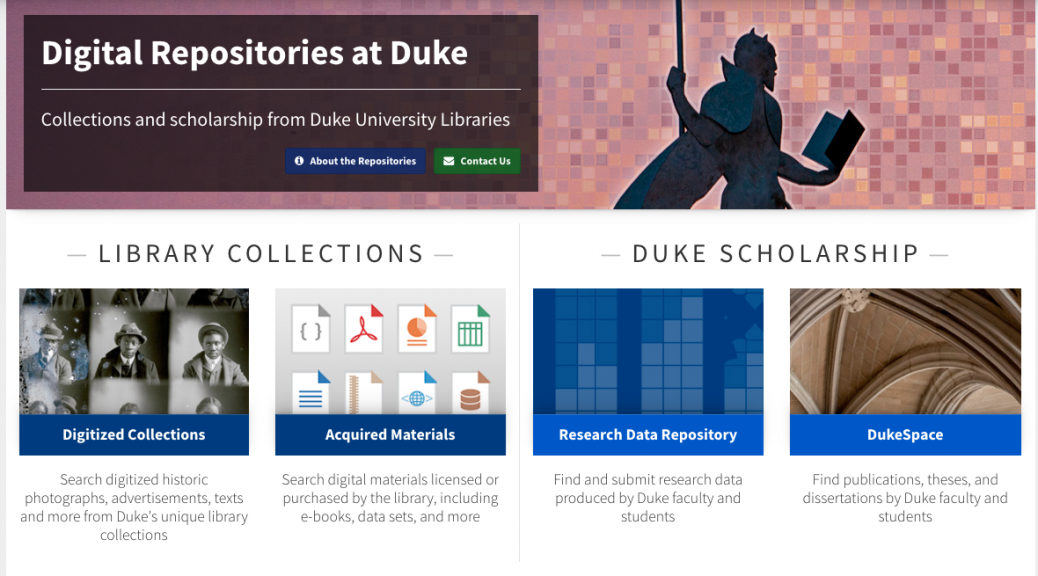The featured image is from a mockup of a new repositories home page that we’re working on in the Libraries, planned for rollout in January of 2020.
Working at the Libraries, it can be dizzying to think about all of our commitments.
There’s what we owe our patrons, a body of so many distinct and overlapping communities, all seeking to learn and discover, that we could split the library along an infinite number of lines to meet them where they work and think.
There’s what we owe the future, in our efforts to preserve and share the artifacts of knowledge that we acquire on the market, that scholars create on our own campus, or that seem to form from history and find us somehow.
There’s what we owe the field, and the network of peer libraries that serve their own communities, each of them linked in a web of scholarship with our own. Within our professional network, we seek to support and complement one another, to compete sometimes in ways that move our field forward, and to share what we learn from our experiences.
The needs of information technology underlie nearly all of these activities, and to meet those needs, we have an IT staff that’s modest in size, but prodigious in its skill and its dedication to the mission of the Libraries. Within that group, the responsibility for creating new software, and maintaining what we have, falls to a small team of developers and devops engineers. We depend on them to enhance and support a wide range of platforms, including our web services, our discovery platforms, and our digital repositories.
This fall, we did some reflection on how we want to approach support for our repository platforms. The result of that reflection was a Statement of Commitment to Repositories Support and Development, a document of roughly a page that expresses what we consider to be our values in this area, and the context of priorities in which we do that work.
The committee that created the statement was our Digital Preservation and Publishing Program, or DP3 as call it in house. We summarized our values as “openness, community and peer engagement, and independence from vended platforms,” which have “guided us to build our repositories on open source software platforms.” We place that work within the context of very large, looming priorities like our transition to FOLIO as our Library Services Platform, and the project to renovate Lilly Library. There are others, not mentioned in the statement, that fill the pages of this blog.
The statement is explicit that we will not seek to find alternative platforms for our repository services in the next several years, and in particular while the FOLIO transition is underway. This decision is informed by our recognition that migration of content and services across platforms is complex and expensive. It’s also a recognition that we have invested a lot into these existing platforms, and we want to carve out as much space as we can for our talented staff to focus on maintaining and improving them, rather than locking ourselves into all-consuming cycles of content migration.
From a practical perspective, and speaking as the manager who oversees software development in the Libraries, I see this statement as part of an overall strategy to bring focus to our work. It’s a small but important symbolic measure that recognizes the drag that we create for our software team when give in to our urge to prioritize everything.
The phrase “context switching” is one that we have borrowed from the parlance of operating systems to describe the effects on a developer of working on multiple projects at once. There are real costs to moving between development environments, code bases, and architectures on the same day, in the same week, during the same sprint, or within even an extended work cycle. We also call this problem “multi-tasking,” and the penalty it imposes of performance is well documented.
Even more than performance, I think of it as a quality of life concern. People are generally happier and more invested when they’re able to do quality work. As a manager, I can work with scheduling and planning to try to mitigate those effects of multitasking on our team. But the responsibility really lies with the organization. We have our commitments, and they are vast in size and scope. We owe it to ourselves to do some introspection now and again, and ask what we can realistically do with what we have, or more accurately, who we are.



Very interesting post, I hope like all.
we read this content, and i think uses full post.